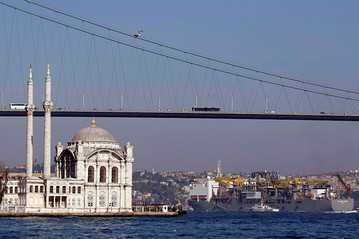By Joe Parkinson

Turkey’s rapidly expanding economy and increasingly temperate political climate have kept the country out of the news of late. But that doesn’t mean all in Turkey is plain sailing.
Policy makers here will shortly have to make a series of crunch, economic decisions that could either underpin solid growth or conspire to derail the recovery.
First up: The government next week must replace popular central bank governor Durmus Yilmaz.
The governor’s five-year tenure has overseen a rapid rise in the bank’s credibility with international markets, not to mention rapid growth and record low inflation. But Mr. Yilmaz also exits the stage as the bank is engaged in one of the world’s most experimental monetary policies; cutting benchmark rates to deter hot money flows while simultaneously raising banks’ reserve ratios to rein in a gathering credit boom.
Investors say the new bank boss will require a deft pair of hands to continue and then exit the current policy without losing credibility with markets. Any evidence the new governor is less committed to the bank’s independence would dent investor confidence.
Some economists say that risk has grown, since the ruling AK-party led by Prime Minister Tayyip Erdogan now controls the Parliament and presidency, making their candidate a shoo-in for governor.
Beyond the central bank, Turkey faces another crucial choice: national elections scheduled for June 12.
Political risk is significantly lower than in recent elections since polling suggests the AK-party’s dominance leaves their victory virtually assured. However, economists caution that a pre-poll spending spree that could undermine market confidence is still a possibility. That’s because AK-party lawmakers here believe they can win a “super-majority” that would allow them to change the constitution without referendum.
“Thus far the AK party’s poll ratings have been so stellar that the need to resort to pork barrelling has been limited,” says Tim Ash, emerging markets economist at RBS in London. “But we believe that political developments, especially after the elections, still need to be closely watched as they still represent ‘clear and present dangers to the market’s’ cosy consensus.”
The economic risks stretch beyond Turkey’s borders. Political turmoil that has swept through the Middle East, toppling regimes in Egypt and Tunisia has sent the price of oil skyward; bad news for energy addicted Turkey. Turkey imports 87% of its petrol, 85% of its coal and a whopping 97% of its natural gas, meaning that when energy prices rise, the economy is exposed.
That exposure is troubling since a sustained oil price increase would further pressurize Turkey’s current account deficit — the Achilles’ heel of the rapidly-growing economy. Turkey’s current-account gap widened 247% to a record high of $48.6 billion last year as domestic demand boomed and imports dramatically outpaced exports.
The swelling deficit has fed market concern that the economy could be exposed to a hard landing if external financing for the deficit dries up; fears that have been magnified by the high ratio of speculative investment, or hot money, used to finance the current-account gap, which could quickly flee Turkey if confidence dries up.
The Middle East turmoil also threatens to destabilize expanding Turkish business interests in the region, which have swelled in tandem with Ankara’s efforts to project diplomatic power beyond its borders. That strategy has been dented, while the risks for regional stability are rising.
Turkey’s challenges are clear — but the economy has maintained astonishing momentum in recent months, with most indicators outperforming analysts’ forecasts. That resilience was underlined this month with confirmation that growth nudged 9% last year — the fastest expansion of any G-20 nation aside from China.
A solid base from which to navigate the headwinds.
– This post originally appeared in The Source.
via Turkey Set to Navigate Headwinds – Emerging Europe Real Time – WSJ.

Leave a Reply